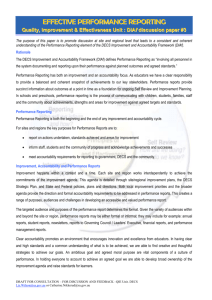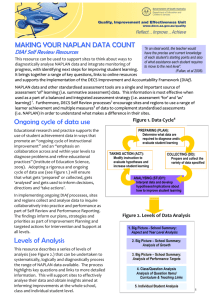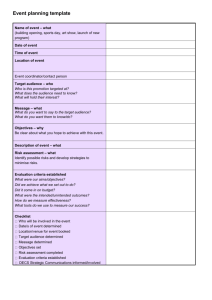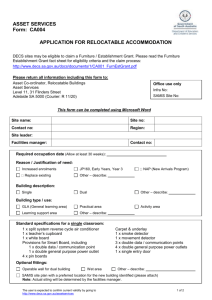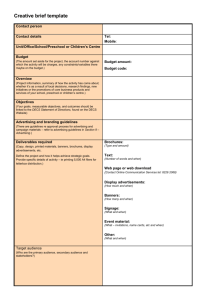Service Delivery Standards for Support Services
advertisement
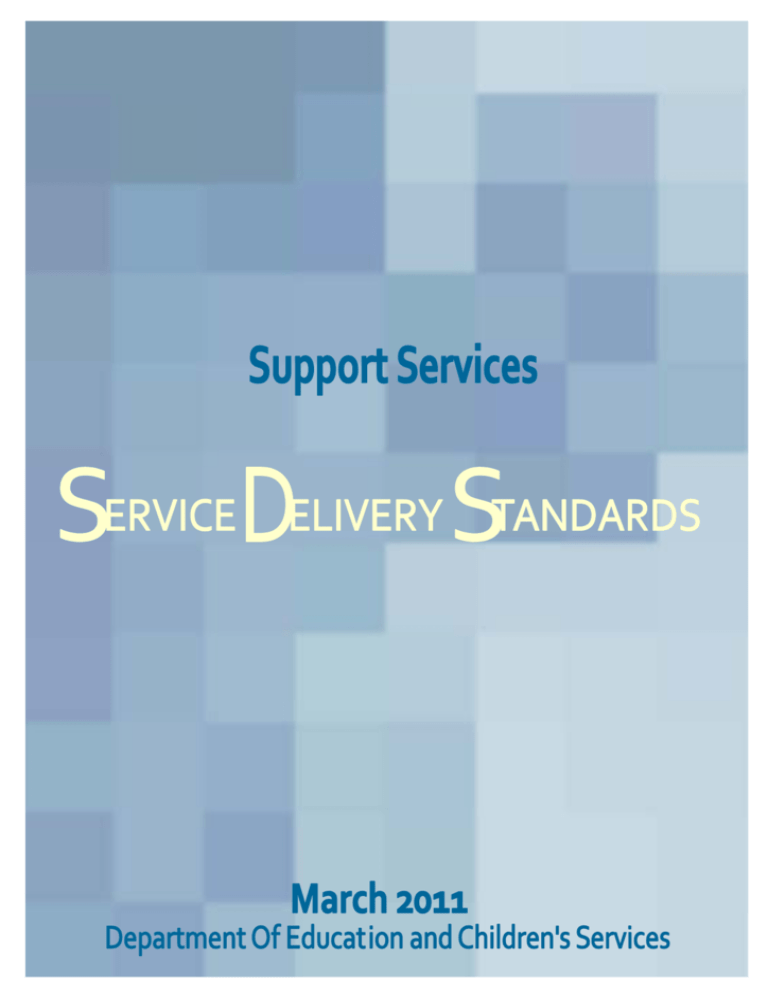
Foreword 1 2 3 What is the purpose of Service Delivery Standards? 3 Who are the Service Delivery Standards for? 3 How were the Service Delivery Standards developed? 4 How are the Service Delivery Standards organised? 4 How will the Service Delivery Standards be implemented? 5 How will the Service Delivery Standards be monitored and reviewed? 6 Service Delivery Standards Overview 7 Standard 1: Service Culture 8 Standard 2: Professional Behaviour 9 Standard 3: Communication 10 Standard 4: Integrated Service Delivery 11 Standard 5: Service Evaluation 12 Standard 6: Pre‐referral 13 Standard 7: Referral 14 Standard 8: Assessment 15 Standard 9: Intervention 16 Standard 10: Resource Allocation 17 Standard 11: Capacity Building 18 Standard 12: Record Management 19 Appendix 1: Key Supporting Documents for Standard 9 20 Appendix 2: Key Supporting Documents for Standard 10 21 Acknowledgements What are Service Delivery Standards The Service Delivery Standards for Support Services mark an important milestone in our joint commitment to strengthen service improvement and accountability for all Support Services staff working in regions. At the beginning of 2009, Support Services were restructured into multidisciplinary teams with services across eight “specialist” areas coming together in the one team under the leadership of one manager. The value of this integrated team approach is well documented and supported. These Standards have been developed to reflect the work of an integrated team of diverse services rather than any single and distinct service. The Service Delivery Standards support a strong service ethos, with Support Services staff building their relationships and partnerships with preschools and schools through clear expectations and accountability. The Standards were approved by the Central Coordination Committee in February 2011, following a comprehensive consultation process with a range of stakeholders. I thank the Working Group and all the people who have contributed to this valuable work. Trevor Radloff DIRECTOR SITE AND REGIONAL IMPROVEMENT AND ACCOUNTABILITY The Service Delivery Standards were developed by the Quality Improvement and Accountability (Support Services) Group comprising the following members: Convenor Sophie Takmaki (Manager Regional Professional Support) Support Services Barbara Lennon (Manager Regional Support Services) Shayne Davis (Manager Regional Support Services) Quality Improvement Catherine Nikkerud (Manager Quality Improvement and Effectiveness) Chris Lawrence (Performance Analysis and Reporting Consultant) Preschools/Schools Graham Wood (Principal Elizabeth North Primary School) Brenton Robins (Principal Victor Harbor Primary School) Lyn Rowe (Preschool Director Happy Valley Kindergarten) Dean Angus (Principal Moonta Area School) Rob Shepherd (Principal Le Fevre High School) Thank you also to the wide range of people who provided feedback and input to drafts and discussions. These people included the Managers Regional Support Services, regional Support Services staff, Regional Directors, Assistant Regional Directors and regional staff, preschool and schools staff and state office staff. Service delivery standards are a set of clear and public criteria with explicit indicators that define the service delivery performance by which Support Services can be monitored and reviewed. The standards define the quality of service that Support Services staff provide, and as such are set at a level that can be achieved within the current resources and with clear, targeted and measurable improvement goals. The overall purpose of Service Delivery Standards is to maximise child and student learning. Support Services staff working in partnership with sites staff in the development and implementation of effective strategies to improve child and student outcomes. The standards aim to: support the provision of consistently high quality service delivery encourage continuous improvement and identify specific areas for improving service quality assist service providers to self audit the quality of their service foster a collective commitment to quality through a common set of clear and measurable criteria assist sites in knowing what to expect from service providers in relation to the quality of service delivery maximise site staff satisfaction and confidence with the service meet reporting and accountability requirements assist with monitoring and evaluation processes regional Support Services staff and their managers regional Support Services staff include: Aboriginal Inclusion Officers, Disability Coordinators, Hearing Services Coordinators, Interagency Behaviour Support Coordinators, Psychologists, Social Workers, Speech Pathologists and Student Attendance Counsellors preschool and school staff children, students and parents corporate DECS – regional and state office staff The Quality Improvement and Accountability for Support Services Group (QIASS) was established in August 2009 to develop service delivery standards in Support Services. The group developed a draft of the service delivery standards using the following range of sources and processes: consideration of previous service delivery standards consideration of the DECS Improvement and Accountability Framework (DIAf) research into other service delivery standards and service efficacy initial consultation with Managers Regional Support Services analysis of Regional Effectiveness Survey data consideration of roles and responsibilities of Support Services staff Consultation on the draft standards was undertaken over two terms (Term 2 and 3, 2010). The following key stakeholder groups were invited to provide feedback on the draft: Managers Regional Support Services regional Support Services staff corporate leadership (Regional Directors, Assistant Regional Directors, School and Regional Operations senior staff, Central Professional Support Officers) regional staff (other members of regional teams) preschools and schools The group considered all feedback during Term 4, 2010 and redrafted the Service Delivery Standards. Further work was also incorporated in the document; monitoring and review processes and key supporting documents. Work on these sections is not finalised and will continue in 2011. The 12 Standards range from very broad areas (eg service culture) to very specific services and processes (eg referral). They cover both public services (ie those directly experienced by sites eg assessment) as well as internal processes (ie those that indirectly may impact sites but that are not directly observable outside of the regional team, eg record management). In this document, please note the following use of particular words: “staff” refers to regional Support Services staff “student” refers to children and students “site” refers to preschool and school staff “parent” is inclusive of caregiver and guardian Each standard is set out as follows: Broad standard topic (eg Service Culture) Service Delivery Standard – one key sentence describing the standard Definition ‐ in italics, a description of the broad topic in the context of this standard What does it look like? – a set of specific quality descriptors How will it be monitored and reviewed? – the process/processes and tools for monitoring and reviewing the standard Key Supporting Documents – relevant documents that should be used in conjunction with the standard, providing contextual information and/or operational detail. Three of the key overarching documents for these standards are the Codes of Ethics for the South Australian Public Sector (2010), the DECS Improvement and Accountability Framework and the DECS Strategic Directions (currently 2011). The Service Delivery Standards need to be viewed with reference to these documents. Regional Support Services staff and their managers can access the majority of the Key Supporting Documents from the Support Services website (www.decs.sa.gov.au/supportservices) . Please note that this website is password protected and can only be accessed by regional Support Services staff and their managers. For all other staff, a wide range of these documents can however be accessed from the DECS public and intranet websites (www.decs.sa.gov.au and http://in.decs.sa.gov.au ). If you are not able to locate a particular document, the regional Manager can be contacted to assist. The phased implementation process will commence in Term 1, 2011. The phases will involve the following: Phase 1 – Communication and Familiarisation Phase 2 – Local planning and baseline information collection Phase 3 – Local improvement goal setting Phase 4 – Local monitor, review and reporting processes During Phase 1, Regional Directors, Assistant Regional Directors and Managers Support Services will work with regional Support Services staff and other regional staff to discuss the standards and foster understanding and engagement. Managers Regional Support Services will lead more focused discussions with their teams regarding common understandings and local implications. Work will occur at statewide service group days and with Central Professional Support Officers. Each region will determine how the standards will be communicated and discussed with preschool and school staff. As a high level of understanding and engagement from sites is critical, it is highly recommended that regions incorporate a range of forums within their communication strategy with sites. Regions can contact Sophie Takmaki (Manager Regional Professional Support) to negotiate any support and assistance they may require during Phase 1. The Service Delivery Standards complement the DECS Improvement and Accountability Framework (DIAf) by providing a set of specific standards for regional Support Services. The principles of improvement and effectiveness, including self review, improvement planning, intervention and support and performance reporting are all important elements of the process. Work will continue in 2011 to develop the specific processes, tools and reporting frameworks to assist regions in monitoring and reviewing the work of regional Support Services against these standards. As with all improvement endeavours, each region will need to begin by gathering baseline information for each of the standards. This information will then form the basis for setting local improvement goals. Regions will determine which standard/s they would like to target and also determine the degree of improvement (eg 5%) they are aiming for. A positive service culture underpins all service provision The service culture refers to the key messages expressed through the attitudes, behaviours and professional qualities of support services staff. This standard complements the guiding values and principles of behaviour and professional conduct standards as set out in the Code of Ethics for SA Public Sector Employee staff are accessible, responsive and flexible reflective practice and enquiry are evident in team processes and activities staff have a commitment to develop sound relationships and work collaboratively with site, regional and state office staff staff collaboration is evident through shared values and goals, and collective responsibility in all phases of services delivery, including planning, intervention and review process Regional Effectiveness Survey DIAf Corporate Self Review Snapshot Tool – Attend to Culture, Focus on Core Business DECS Values DECS Goals Code of Ethics for SA Public Sector Employees DECS Complaint Policy DECS Complaint Resolution for Employees Procedure Guide to Resolving Grievances and Complaints for DECS Employees Staff display a high level of professional behaviours and attitudes in all aspects of their service provision A set of behaviours and attitudes that are exhibited by support services staff in their work and interactions with others. This standard complements the guiding values and principles of behaviour and professional conduct standards as set out in the Code of Ethics for SA Public Sector Employee staff maintain high levels of specialist knowledge, keep up‐to‐date with current research and methodologies and processes staff participate in induction processes, professional development, effective performance management processes and professional peer supervision and support staff display effective interpersonal skills for working in partnership with others staff follow through on negotiated actions and commitments staff maintain confidentiality staff positively promote DECS policies and guidelines Performance Management Review Process Regional Effectiveness Survey DIAf Corporate Self Review Snapshot Tool – Attend to Culture, Listen and Respond Code of Ethics for SA Public Sector Employees Code of Ethics (Psychologists) Code of Ethics (Speech Pathologists) Code of Ethics (Social Workers) Standards for Highly Accomplished Special Education Teachers Performance Management Policy Partnerships for Performance A new relationship with schools and preschools – Discussion Paper 1 Communication processes are efficient and effective Communication refers to the process of conveying information through written, verbal and nonverbal (behavioural) processes information provided is accurate, up‐to‐date, easy to understand and timely staff communicate effectively with a diverse range of site staff, parents, students, regional and state office staff staff keep sites informed of their involvement in key events with students by agreed methods of communication staff document relevant communication Regional Effectiveness Survey DIAf Corporate Self Review Snapshot Tool – Listen and Respond Audit of student files (hard copy and electronic) Communications Guide for staff in schools, preschool, children’s centres and corporate offices ICT Security Policy ICT Internet Access and Use Policy ICT Email Access and Use Policy An integrated service delivery approach that provides a holistic view and coordinated response to issues is evident in every aspect of service provision Integrated service delivery refers to how a group of people from different professional backgrounds work together to deliver a holistic, coordinated and collaborative service to improve outcomes for students staff use the DECS and local operational policies and processes to provide an integrated service staff respect the skills, expertise and different perspectives other staff bring to the team staff use integrated information and record managements systems that facilitate effective information sharing there is a negotiated and documented case coordination strategy with the site joint approaches with other government and non‐government agencies are established to provide coordinated support, where relevant Regional Effectiveness Survey DIAf Corporate Self Review Snapshot Tool – Listen and Respond, Think Systemically, Focus on Core Business Audit of student files (hard copy and electronic) Feedback about other agencies from sites Integrated Services – Discussion Paper Case Management Processes (to be developed) Information Sharing: Guidelines for Promoting the Safety and Wellbeing of children, young people and their families Collaboration between external speech pathologists and DECS speech pathologists Systemic review and evaluation processes inform service improvements and future planning Service review and evaluation refers to the assessment of the effectiveness and efficiency of processes, programs, and outcomes with a view to improvement of service. This standard complements the DECS Improvement and Accountability framework (DIAf) and needs to be implemented within this overall framework. regular and systematic processes to monitor, review and evaluate the service are in place to inform planning and continuous improvement evaluation processes collect both quantitative and qualitative data over time to identify trends DIAf Corporate Self Review Snapshot Tool – Make Data Count, Continuously Improve, Set Directions Data Reports Evaluation Reports DECS Improvement and Accountability Framework (DIAf) Standards for Improvement and Accountability Discussion Paper (2009) Pre‐referral processes facilitate timely support to sites to support students The pre‐referral process involves the discussion and consultation that occurs with the site to clarify concerns and determine the support response which may or may not result in a referral to support services sites are provided with clear information about the roles and responsibilities of each service and their priorities the site is informed of approximate timelines for delivering service, if there is an agreement that this will progress to referral staff follow the statewide pre‐referral process Specific timeline responses timely response to critical incidents will be provided Interagency Behaviour Support staff are required for exclusion meetings for students under compulsion within five days of notification of intention to exclude Regional Effectiveness Survey Statement of Directions SA Strategic Plan Aboriginal Strategy Pre‐referral Process Document Casework Priorities for Speech Pathology (statewide) Casework Priorities for Student Attendance (statewide) Contributing to Site pre‐referral processes (Attendance) Effective and efficient processes are used to manage requests for service The referral process is a formal mechanism by which sites request support following a pre‐referral process an email acknowledgement is sent to the referring site within 2 working days by regional administrative staff staff enters the case status on the Support Services Data System within 2 weeks of receiving the referral request there are clear case closure processes for individual student referrals Regional Effectiveness Survey Audit of SSDS Support Services Referral Process Casework Status Guidelines Quality assessment processes which provide a range of data are used to inform service delivery Assessment refers to the information gathering process to determine need/s and/or diagnosis. This process may involve a range of people including students, site staff, parents and other professionals. It may include observation, testing, interview, screening, checklists and viewing samples of work. assessment commences with the pre‐referral discussion and where additional assessment is required, timelines are negotiated with site the assessment process is underpinned by a strengths‐based perspective and takes into account contextual factors staff use a range of assessment processes and consider the student holistically, taking into account all relevant information the assessment information is documented and used to inform all aspects of planning and decision making documentation is clear, easily understood and includes recommendations for improving learning outcomes, monitoring and review processes, and timelines formal written reports follow the report writing guidelines for the specific service group and are provided within 4 weeks of completing the assessment process or as otherwise negotiated with the site Regional Effectiveness Survey Casework discussion (documented) Audit of student file (hard copy and electronic) Report writing guidelines (Psychology) Report writing guidelines (Speech Pathology) Report Format (Social Work) Protective practices for staff in their interactions with students Staff work in partnership with site staff and parents to develop, implement and monitor effective interventions that improve student engagement and learning outcomes Intervention refers to a broad range of strategies with the intent of achieving agreed engagement and learning outcomes. Interventions may be targeted at a range of levels – individual student, class, site, region. Interventions may include one or more of the following: direct work with teachers, provision of specialist information and advice, consultation, development and review of individual program/plan (eg behavioural plan, learning plan, NEP), provision of resources and assisted technologies, and interagency liaison. the interventions are evidence‐based and staff apply up‐to‐date specialist knowledge and expertise the interventions consider creative and innovative approaches to meet the individual and/or whole of site needs the interventions have clear and agreed goals which are specific, measurable, achievable, relevant and time‐specific the intervention includes appropriate transition and/or transfer processes as relevant the interventions have an agreed review process and timelines Regional Effectiveness Survey Audit of student file (hard copy and electronic) Job and Person Specifications for each service Protective practices for staff in their interactions with students See Appendix 1 for more detailed list Resource allocation processes are efficient and targeted to improve student engagement and learning outcomes Resource allocation refers to the activities involved in the allocation of additional resources and/or funding to support students and/or the site resource allocation is based on statewide and published criteria and is regularly reviewed to reflect changing needs resources are planned, effectively managed and reviewed resources are targeted to align with state and local priorities DIAf Corporate Self Review Snapshot Tool – Target Resources Quality Assurance, Monitoring and Review Process (SVPS) Disability Support Program Eligibility Criteria Preschool Support Program See Appendix 2 for more detailed list Responsive and targeted capacity building increases site confidence and ability to effectively support students Capacity building refers to the processes of strengthening the knowledge, abilities, skills and behaviour of sites to more effectively support students. This may occur at a range of levels (ie state and regional, cluster, single site, targeted staff in a site or across sites) current research and a range of evidence based practices and processes are provided to further develop the capacity of sites to meet student needs staff develop whole of site and/or whole of region capacity building strategies informed by a range of data site professional learning is evaluated to determine the learning outcomes sites have ready access to information about available professional development provided by regional staff and the opportunity to negotiate any additional professional development Regional Effectiveness Survey Evaluation of PD (feedback sheets) Data Collection of PD provided Provision of Training and Development Data Collection Process (to be developed) Supporting our teachers – discussion Paper 2 Hard copy and electronic records provide up‐to‐date and relevant information pertaining to students referred and comply with record management requirements Record management refers to the practice of maintaining and storing information regarding students referred to support services staff meet the record management and minimal data entry requirements for the SSDS there are clear and effective processes for the tracking and transfer of student records within and across regions protocols to protect the confidentiality of student records are followed staff record information in a professional, objective and timely way consistent statewide processes for the archiving and disposal of student records are followed Audit of student files (hard copy and electronic) Records Management documentation and Fact Sheets SSDS Minimal Requirements Confidentiality – Discussion Paper (to be developed) User Agreement (Student File) Freedom of Information Act 1991 Information Management Policy – Privacy and Confidentiality Information Sharing: Guidelines for Promoting the Safety and Wellbeing of children, young people and their families Information Privacy Principles DECS Information Management Policy – custodianship and Ownership DECS Procedure – Destruction of Records DECS Disposal Schedules ATTENDANCE Attendance Policy Instructions for Prosecution for Non‐attendance Addressing issues of non‐attendance at the school level Attendance Improvement Package SAC Casework Practices Interagency Processes for High Risk Children – Chronic School Non‐Attenders BEHAVIOUR AND WELLBEING Behaviour Management Guidelines for Students with disabilities Children’s Protection Act Cyber‐safety – Keeping Children safe in a connected world: Guidelines for schools and preschools Procedures for suspension, exclusion and expulsion Intervention Matters – a policy statement and procedural framework for the management of suspected drug‐related incidents in schools Learner Wellbeing Framework Birth to 12 Responding to problem sexual behaviour in children and young people School Discipline Policy Supporting and managing children’s behaviour – an early childhood resource DISABILITY AND HEALTH Students with Disabilities Policy Disability Discrimination Act Disability Standards for Education Health Support Planning in education and children’s services On the Same Basis Service Provision Guidelines (Hearing) Special Options and Statewide Programs for Students with Disabilities Speech Pathology Service Guidelines PLANS Attendance Improvement Plan, Health Support Plan, Individual Education Plan, Negotiated Education Plan, Student Development Plan Level of Support Descriptors for students with disabilities Disability Supplementary Funding (DSF) Challenging Behaviour Funding Resource Allocation Adjustment Panel (RAAP) Preschool Support Program Preschool Access Profile Health and Personal Care Criteria and Evidence for Intensive Level of Support Guidelines for High Sustained Level of Support (Hearing, Vision and Dual) Guidelines for Very High Sustained Level of Support
